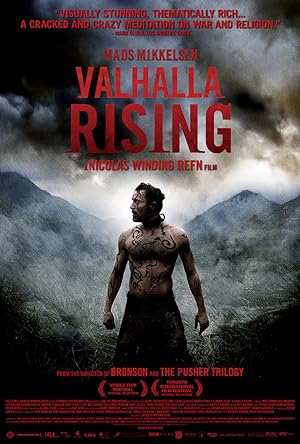Valhalla Rising is a film directed by Nicholas Winding Refn and stars Mads Mikkelsen, which is the real (superficial) reason that the film ended up in my queue. Superficially it follows a silent, mysterious man who is unlike the people around him, the Scottish pagans who treat him like a slave or the Crusaders who see him as a useful tool or a scapegoat depending on the circumstances. There is very little dialogue, and events depicted on screen are not necessarily unfolding in linear time or on Earth. Some are dreams. Some are in the spirit realm between Earth and heaven.
Valhalla Rising is one of Refn’s more inscrutable films so people who hate esoteric films should probably run screaming in the opposite direction unless you really think that Mikkelsen is an impressive (hot) actor and enjoy his work. I’m not trying to watch all of Refn’s movies, but I have watched a lot of them organically. Bronson, Drive and even The Neon Demon are far more conventional than this entry in his filmography so if The Neon Demon left you shaking your head, you should probably reconsider before dipping your toe in these waters.
I’m actually glad that I saw Pilgrimage and Justin Kurzel’s Macbeth, which are far more charitable about human nature and God than Valhalla Rising, before. Those subsequent films heavily borrow from this one so it helped me to understand what was going on a little more. I actually guessed what was going to happen even though this film is not predictable. I just watch too many movies or maybe in passing I heard the film described, but did not know it was this particular one. During the end of one journey, I seriously did think, “Oh, they’re in _____________. Is that possible, especially with no wind?” I would honestly like to know. Apparently it helps if you know a lot about Norse mythology, which I know a bit.
Apparently Kenneth Anger’s experimental short films, Scorpio Rising and Lucifer Rising, inspired the title, Valhalla Rising. I have managed never to see Anger’s films even though I was aware of their existence. I’m artsy fartsy, but not THAT artsy fartsy. After watching the film, I decided to see them to see if it helped elucidate my understanding of Refn’s film, which it did if I squinted and turned my head, but honestly if Refn is already fairly avant-garde for you, don’t even attempt to do this because you will probably want that hour back. It only confirmed what I already thought, but did not reveal anything more.
S
P
O
I
L
E
R
S
These two factions of people, the Crusaders and the pagan, think that they know God or gods respectively, but they only view their spiritual relationship in terms of what it can get them: power, wealth, etc. One Eye may actually be Odin, which explains why each faction’s relationship with him is so problematic and flawed, and none of them, except the boy, accurately anticipate his actions or can communicate with him. If he is not Odin, he came from Hel, which the viewers and the Crusaders hear as Hell, which is short for Valhalla, but when they arrive in America (yes, you read that correctly), they think that it is Hell. So is One Eye actually from America? There is a theory that Vikings made it to America soon after the Native Americans, but then did not One Eye originally come from somewhere else? This is actually why I favor the Odin theory over the Viking settler trying to return home because no one ever says that he is from elsewhere, and Scottish people would have known about those countries at that time, right? Characters keep talking about wanting to return home, but they don’t remember how to get there, where it is or are unable to get there because they suspect that they’re really dead, which since One Eye occupies different times and spaces, dimensions, simultaneously may be accurate since in the future, some of them do die. If he is Odin, then I think that he came to Scotland and randomly killed the chieftain’s son as part of an unwitting offering on their part or his boy was always the plan, and the chieftain’s son did something to the boy’s family. Unlike what people normally attribute as Norse god values, he sacrifices himself to save the boy from being slaughtered by the Native Americans, but um, how is that kid going to either survive alone or build a boat and get back home? Still seems like a fairly bleak life to me.
Valhalla Rising is framed as men needing to reconcile with nature instead of being distracted by the cross and considering the wilderness as evil so it is actually a happy ending. The landscape in America as opposed to Scotland is lush and not barren. By giving the boy a life there, One Eye frees him from society’s concepts of man’s spiritual hangups, whether pagan or Christian, and he can live freely. Odin saves the boy’s soul and body by restoring his relationship with nature, which is the real deity.
On a lighter note, Valhalla Rising is an artsy fartsy Unleashed meets Jeremiah Johnson with a Nordic Jesus twist. All you really need is Mikkelsen jumping out of the boat in slow motion to get your life. The man is fine. The fight scenes are so fast that you blink and miss them, but they’re brutal and good. I just wish that my slow mo on my remote control game were stronger.
Stay In The Know
Join my mailing list to get updates about recent reviews, upcoming speaking engagements, and film news.





